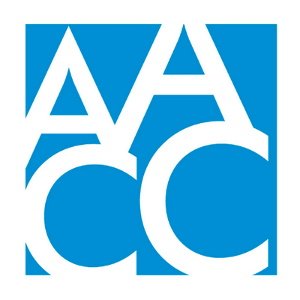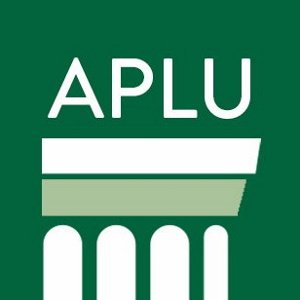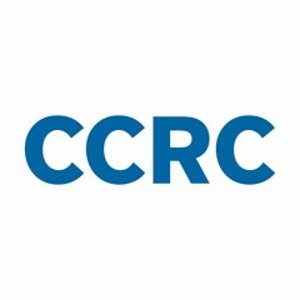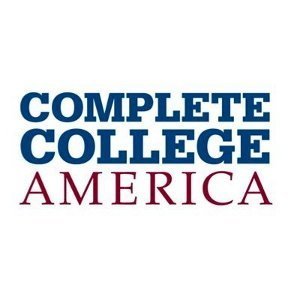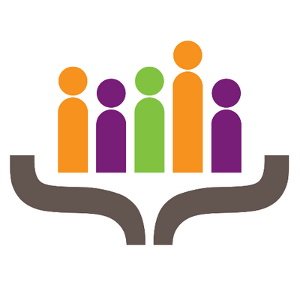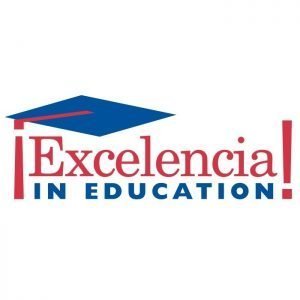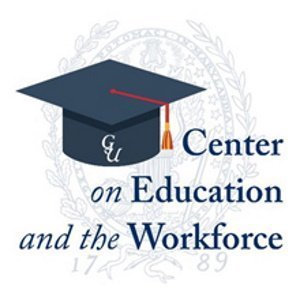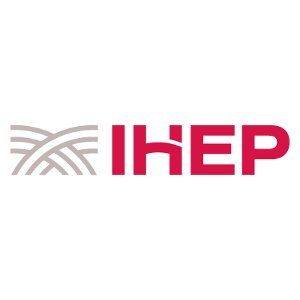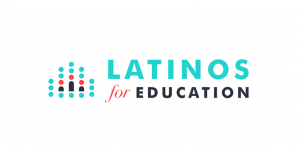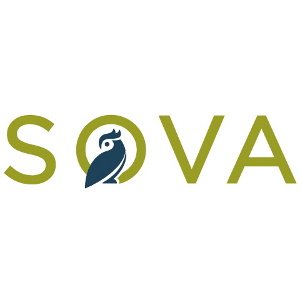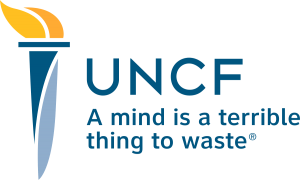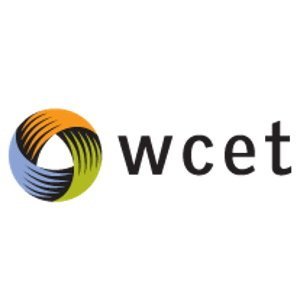The Higher Ed Equity Network:
Backed by Catalyst:Ed

Catalyst:Ed is proud to serve as the backbone organization for the Higher Ed Equity Network.
You can learn more about Catalyst:Ed’s mission, guiding beliefs, and our work here.
About the Higher Ed Equity Network
Vision: The Higher Ed Equity Network’s vision is for higher education to be a launching pad that dramatically improves the economic and social mobility of Black, Latino/a/x, Indigenous, and other historically underserved students. Achieving this will require changes in postsecondary policy and practice.
Objectives: Institutions act in new ways to ensure that Black, Latino/a/x, Indigenous, and other historically underserved students enroll and succeed in educational pathways that lead to economic vitality based on strategies such as more effective advising and support, improved transfer, and equity audits to inform how they think about and design reforms.
-
Federal and state funding and data policies help Black, Latino/a/x, Indigenous students, and other students whose communities are marginalized, excluded, discriminated against, and minorities by the status quo enroll and succeed in economically viable pathways versus leaving college with debt they can never repay.
-
Higher education advocates, funders, and civil rights organizations have a shared understanding of the pattern of injustice and actively communicate with institution leaders and policymakers about the imperative for Black, Latino/a/x, Indigenous, and other historically underserved students to complete pathways that lead to economic vitality.
Why Black, Latino/a/x, and Indigenous Students?
Black, Latino/a/x, and Indigenous students face distinct barriers to achieving a postsecondary credential of value that are solely due to their racial or ethnic identity. While White students can face barriers, they are not linked to their racial or ethnic identity and background, and in some instances, have not experienced the same systematic, unjust disadvantages that confront Black, Latino/a/x, and Indigenous students. Racism permeates many aspects of life in America ranging from inequitable health care, K-12 education, financial services, and justice systems; changing that paradigm will require a distinct focus on dismantling racism in all areas of life, including higher education.
Black, Latino/a/x, and Indigenous students are increasingly the largest population of higher education students. Breaking down the barriers preventing these students from succeeding in higher education means we are supporting the future workforce. And, changes that support Black, Latino/a/x, and Indigenous students ultimately help all students – including those from low-income communities. It has repeatedly been shown that policies and programs designed to benefit one group of individuals often end up benefiting all of society. This work will, by necessity, be data-driven. We will consistently review outcomes for students of all racial, ethnic, and socioeconomic groups to ensure that we are closing attainment gaps – not creating new ones.
But ultimately, our work must include a focus on the unique challenges that must be addressed and unique qualities that must be affirmed among Black, Latino/a/x, and Indigenous students. Anything less than an explicit, distinct focus related to each student group is effectively keeping the door wide open to defaulting to the more generic “students of color” nomenclature. In our experience, if there is any variable—any at all—that will allow a shift from the focus on race—specifically Black Americans—people take them out. It will be about income. It will be about class. It will be about educational attainment. The one thing it will not be about—and must be about if we are to make a difference—is race.
Our Strategy
The Network’s strategy is to function as a policy, strategy, and national influence group that will persuade and position policymakers, higher education institutions, advocates, and funders to take new, bolder, and more accountable actions that lead to economic and social mobility for Black, Latino/a/x, Indigenous, and other historically underserved students.
The Network will create a change movement to influence and align the efforts of policymakers, postsecondary leaders, and advocates so that:
- Equitable access to postsecondary credentials of value will improve; and
- Higher education will be a launching pad that dramatically improves the economic and social mobility of historically underserved students.
The Network has identified four operational strategies to guide its work:
-
Communicate a New Imperative
-
Elevate Policy Solutions
-
Leverage Practice Improvements within Systems and Colleges
-
Generate Learning for Effective Action
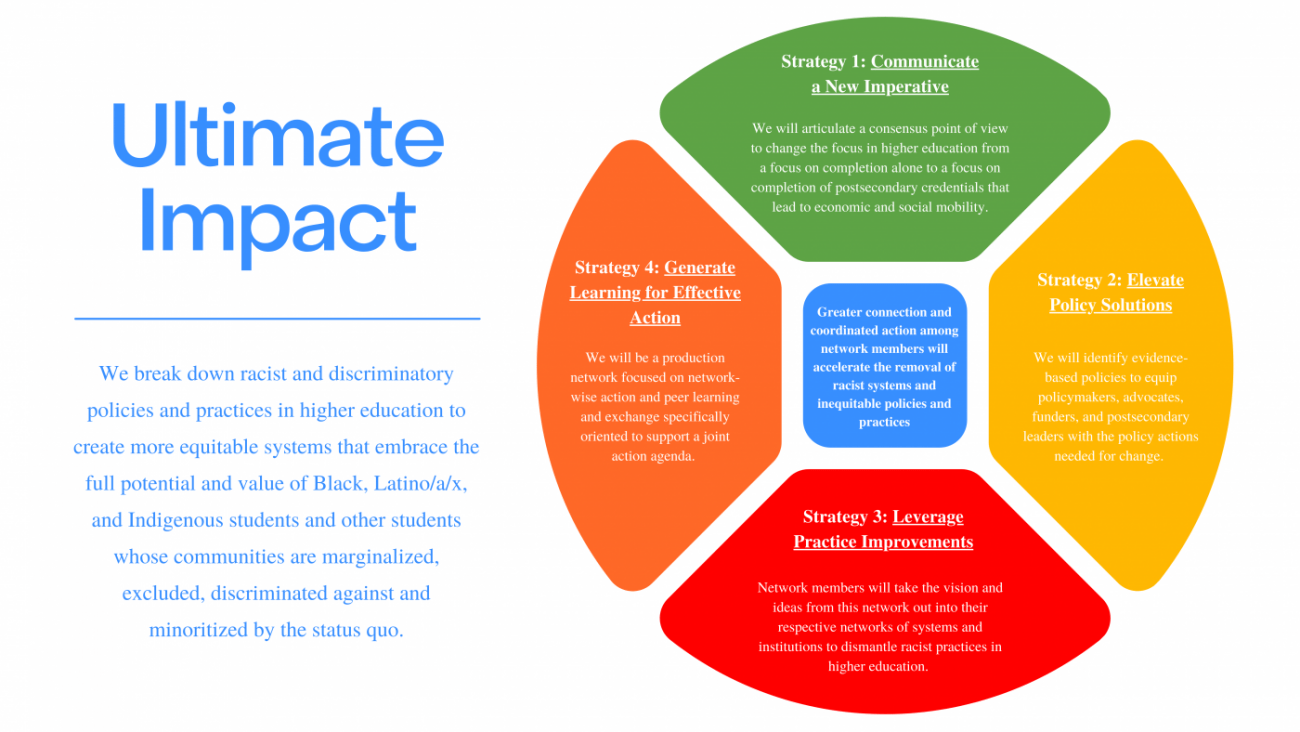
Network Member Organizations
Full Members: Organizations who have agreed to a minimum three-year commitment of a senior leader (Member Representative) at the Member Organization. These Member Representatives are expected to attend all Network convenings and actively participate in at least one of the Strategy Coalition groups.
Provisional Members: Organizations who have agreed to a minimum 1-year commitment of a senior leader (Provisional Member Representative) at the Provisional Member Organization. These Provisional Member Representatives are expected to attend all Network convenings and actively participate in at least one of the Strategy Coalition groups.
Advisory Members: will support the Network in an advisory capacity based on their expertise and/or lived experience (e.g., institutional leaders, students, data-focused organizations). Advisory Members are required to participate in the Network convenings to understand the full scope of Network activities.
Our Governing Board

Amelia Parnell
Governing Board Chair
Bridget Burns
Coalition #4 Chair
Elisha Smith Arrillaga

Karen Vignare
Coalition #3 Chair
Kenyatta Lovett

Mamie Voight

Michael Collins

Michele Siqueiros





